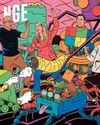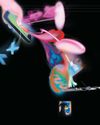
MANY OF TODAY's programmersexcuse me, software engineers-consider themselves "creatives." Artists of a sort. They are given to ostentatious personal websites with cleverly hidden Easter eggs and parallax scrolling; they confer upon themselves multihyphenate job titles ("ex-Amazon-engineer-investorauthor") and crowd their laptops with identity-signaling vinyl stickers. Some regard themselves as literary sophisticates. Consider the references smashed into certain product names: Apache Kafka, ScyllaDB, Claude 3.5 Sonnet.
Much of that, I admit, applies to me. The difference is I'm a tad short on talents to hyphenate, and my toy projectswith names like "Nabokov" (I know, I know) are better off staying on my laptop. I entered this world pretty much the moment software engineering overtook banking as the most reviled profession. There's a lot of hatred, and self-hatred, to contend with.
Perhaps this is why I see the ethos behind the programming language Go as both a rebuke and a potential corrective to my generation of strivers. Its creators hail from an era when programmers had smaller egos and fewer commercial ambitions, and it is, for my money, the premier general-purpose language of the new millennium-not the best at any one thing, but nearly the best at nearly everything. A model for our flashy times.
IF I WERE to categorize programming languages like art movements, there would be mid-century utilitarianism (Fortran, COBOL), high-theory formalism (Haskell, Agda), Americorporate pragmatism (C#, Java), grassroots communitarianism (Python, Ruby), and esoteric hedonism (Befunge, Brainfuck). And I'd say Go, often described as "C for the 21st century," represents neoclassicism: not so much a revolution as a throwback.
This story is from the {{IssueName}} edition of {{MagazineName}}.
Start your 7-day Magzter GOLD free trial to access thousands of curated premium stories, and 9,000+ magazines and newspapers.
Already a subscriber ? Sign In
This story is from the {{IssueName}} edition of {{MagazineName}}.
Start your 7-day Magzter GOLD free trial to access thousands of curated premium stories, and 9,000+ magazines and newspapers.
Already a subscriber? Sign In

MOVE SLOWLY AND BUILD THINGS
EVERYTHING DEPENDS ON MICROCHIPS-WHICH MEANS TOO MUCH DEPENDS ON TAIWAN. TO REBUILD CHIP MANUFACTURING AT HOME, THE U.S. IS BETTING BIG ON AN AGING TECH GIANT. BUT AS MONEY AND COLOSSAL INFRASTRUCTURE FLOW INTO OHIO, DOES TOO MUCH DEPEND ON INTEL?

FOLLOW THAT CAR
CHASING A ROBOTAXI FOR HOURS AND HOURS IS WEIRD AND REVELATORY, AND BORING, AND JEALOUSY-INDUCING. BUT THE DRIVERLESS WORLD IS COMING FOR ALL OF US. SO GET IN AND BUCKLE UP.

REVENGE OF THE SOFTIES
FOR YEARS, PEOPLE COUNTED MICROSOFT OUT. THEN SATYA NADELLA TOOK CONTROL. AS THE COMPANY TURNS 50, IT'S MORE RELEVANT-AND SCARIER-THAN EVER.

THE NEW COLD WARRIOR
CHINA IS RACING TO UNSEAT THE UNITED STATES AS THE WORLD'S TECHNOLOGICAL SUPERPOWER

CALIFORNIA DREAMIN'
KINDRED MOTORWORKS VW BUS - Despite being German, the VW T1 Microbus is as Californian as the Grateful Dead.

THE INSIDE SCOOP ON DESSERT TECH
A lab in Denmark works to make the perfect ice cream. Bring on the fava beans?

CONFESSIONS OF A HINGE POWER DATER
BY HIS OWN estimation, JB averages about three dates a week. \"It's gonna sound wild,\" he confesses, \"but I've probably been on close to 200 dates in the last year and a half.\"

THE WATCHFUL INTELLIGENCE OF TIM COOK
APPLE INTELLIGENCE IS NOT A PLAY ON \"AI,\" THE CEO INSISTS. BUT IT IS HIS PLAY FOR RELEVANCE IN ALL AREAS, FROM EMAIL AUTO-COMPLETES TO APPS THAT SAVE LIVES.

COPYCATS (AND DOGS)
Nine years ago, a pair of freshly weaned British longhair kittens boarded a private plane in Virginia and flew to their new home in Europe.

STAR POWER
The spirit of Silicon Valley lives onat this nuclear fusion facility's insane, top-secret opening ceremony.